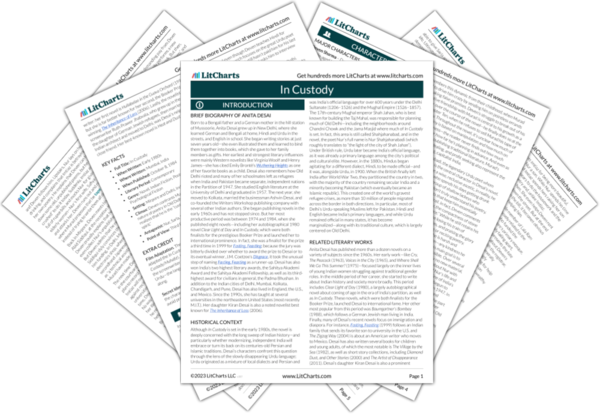The broken tape recorder represents the way that modern life and technology fail to live up to their promise in India. After Nur agrees to let Deven interview him and record some of his unpublished work, Murad persuades Deven that technology is the future, and it would be far easier to tape-record the poems (and transcribe them later) than take dictation by hand. Siddiqui and Mr. Rai persuade the college librarian to purchase the recorder as a way to promote “audio-visual methods of teaching.” (The novel is set in the early 1980s; such recording technology was not a common research tool yet in India.) Murad takes Deven to Mr. Jain’s electronics shop, where Murad and Mr. Jain dupe him into taking an old, secondhand Japanese tape recorder. Deven knows that he’s being manipulated but feels that he has no option, so he goes along with it and even agrees to hire Mr. Jain’s surly nephew Chiku to operate the tape recorder. Surely enough, the machine doesn’t work. After several weeks of recording sessions, the tapes are full of background noise, honking sounds, and occasional drink orders—but almost no poetry. The recorder’s failure dooms Deven’s project, leaving him with just one usable poem: the one Nur wrote down by hand in his notebook. Deven worries that the college will accuse him of misusing its funds and fire him. Thus, Deven’s attempt to preserve traditional knowledge through modern technology backfires. Metaphorically speaking, perhaps the recording device does not pick up Nur’s poetry because Urdu comes from a bygone age and is incompatible with India’s aspiration to become a modern, English-speaking democracy with an advanced, globalized economy. On another level, the recorder’s failure is a warning against placing too much faith in new, modern, foreign technologies when traditional methods still work perfectly well.
Tape Recorder Quotes in In Custody
Later Deven could not understand how it all come about—how he, the central character in the whole affair, the protagonist of it (if Murad were to be disregarded), the one on whom depended the entire matter of the interview, the recording and the memoirs, to which Siddiqui was no more than an accessory, having arrived on the scene accidentally and at a later stage, and in which he played a minor role—how he, in the course of that evening, had relinquished his own authority and surrendered it to Siddiqui who now emerged the stronger while he, Deven, had been brought to his knees, abject and babbling in his helplessness. How?
Frantic to make [Nur] resume his monologue now that the tape was expensively whirling, Deven once forgot himself so far as to lean forward and murmur with the earnestness of an interviewer, “And, sir, were you writing any poetry at the time? Do you have any verse belonging to that period?”
The effect was disastrous. Nur, in the act of reaching out for a drink, froze. “Poetry?” he shot at Deven, harshly. “Poetry of the period? Do you think a poet can be ground between stones, and bled, in order to produce poetry—for you?”
[Nur] broke into a verse that Deven had never heard before, that no one in the room had heard before, that entered into their midst like some visitor from another element, silencing them all with wonder. […] Seizing the book from [Deven], [Nur] wrote in it himself, holding it on his knee, stopping to lick the pencil now and then, peering at the letters with his cataract-filled eyes, while around him the babble broke out again as his audience excitedly discussed this new verse of his. […] This was the audience Nur had always had to try his verses on, Deven saw, revolted by their flattery, and he knelt behind Nur in reverential silence, watching him write, keeping himself apart from the others, the one true disciple in whose safe custody Nur could place his work.
Deven put up both his hands and pushed him back as far as he could on the small landing, till his back was against the wall. “I can’t do that,” he hissed, “it is the property of the college.”
[…]
Deven went down the wooden staircase as steadily as he could although his knees shook weakly. Murad’s perfidy filled him with the iron of resistance and he felt steady, straight. As he reached the foot of the stairs, he heard Murad call over the banisters, “One last time I am offering to help—one last time. Sole rights! Only sole rights!”
Deven went towards the exit without looking back.












